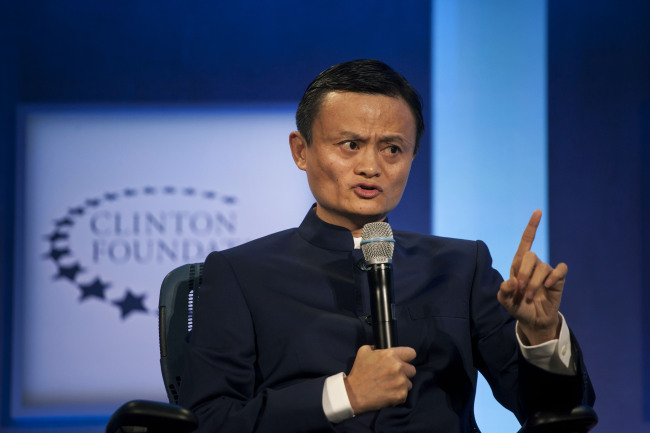SHANGHAI (AFP) ― Chinese e-commerce giant Alibaba, which completed the world’s largest stock offering earlier this month, has received approval to set up a private bank, it was announced Monday.
The China Banking Regulatory Commission said Alibaba would be the majority shareholder with a 30 percent stake in a private bank to be established in the eastern province of Zhejiang, where the company is headquartered.
Alibaba’s ambitions extend beyond e-commerce and it has already sought to shake up state banks with a financial product called Yuebao, an investment fund that offers better returns than traditional deposits.
Other major shareholders in the newly approved bank include units of privately-owned conglomerate Fosun with 25 percent, auto parts maker Wanxiang Group with 18 percent and investment firm Yintai with 16 percent.
Alibaba’s listing on the New York Stock Exchange raised a total of $25 billion, making it the largest stock offer in history and founder Jack Ma the richest person in China, according to the annual rich list of luxury magazine publisher Hurun Report.
 |
Jack Ma, chairman of Alibaba Group Holding Ltd. (Bloomberg) |
Alibaba, estimated to hold more than 90 percent of the Chinese market for consumer-to-consumer transactions, embarked on an acquisition frenzy before the listing.
On Monday Shenzhen-listed Beijing Shiji Information Technology, which provides IT solutions to the hotel industry, said a subsidiary of Alibaba had signed an agreement to pay 2.81 billion yuan ($457 million) for a 15 percent stake in the company, according to stock exchange filings.
The banking regulator on Monday also approved a Shanghai-based private bank whose major shareholder will be JuneYao Group, which has businesses ranging from food to aviation.
JuneYao will hold 30 percent while apparel maker Metersbonwe will take 15 percent, the CBRC said.
In the past two months the country has approved five private banks including one invested in by Internet giant Tencent, parent of China’s most popular messaging app WeChat and a rival of Alibaba.
China previously had only two private banks, Minsheng and Ping An.
Apart from the two announced Monday it approved three in late July, to be based in the southern boom town Shenzhen, the northern port of Tianjin and the eastern city of Wenzhou.
The approvals followed a declaration by the government in March that it would reform the banking sector, which is dominated by four state-owned banks ― though all of them have minority shares listed on the stock market.






![[Exclusive] Hyundai Mobis eyes closer ties with BYD](http://res.heraldm.com/phpwas/restmb_idxmake.php?idx=644&simg=/content/image/2024/11/25/20241125050044_0.jpg)
![[Herald Interview] 'Trump will use tariffs as first line of defense for American manufacturing'](http://res.heraldm.com/phpwas/restmb_idxmake.php?idx=644&simg=/content/image/2024/11/26/20241126050017_0.jpg)
![[Herald Review] 'Gangnam B-Side' combines social realism with masterful suspense, performance](http://res.heraldm.com/phpwas/restmb_idxmake.php?idx=644&simg=/content/image/2024/11/25/20241125050072_0.jpg)